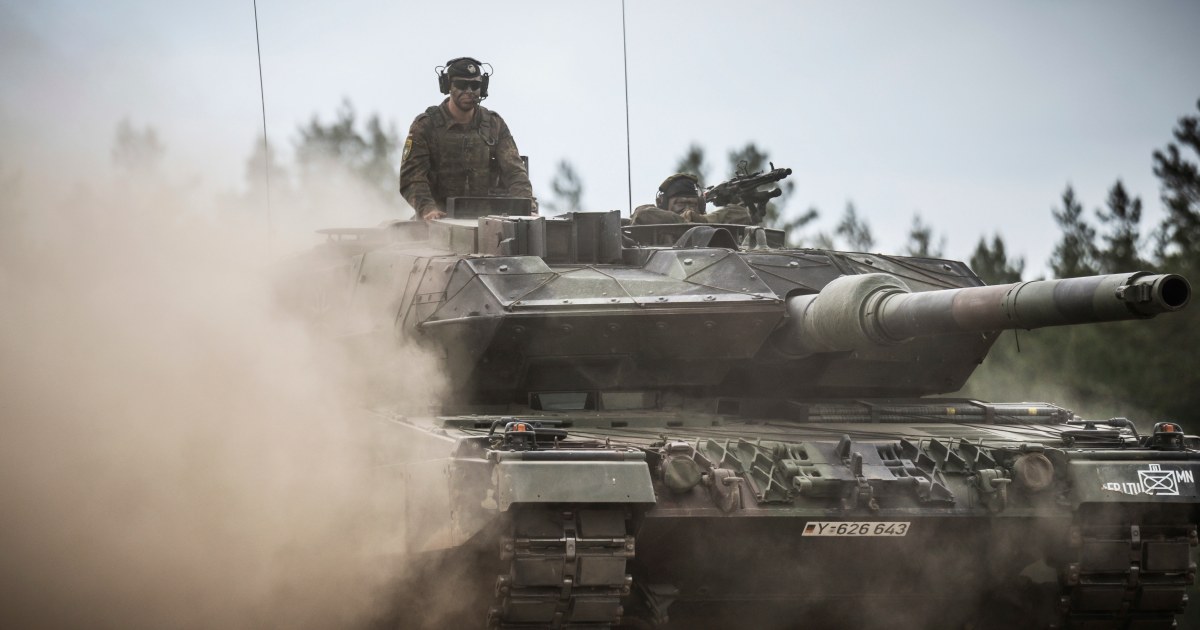
www.nbcnews.com
Ukraine is getting the tanks it pushed for after rift in West
Germany said Wednesday it would send Leopard tanks to Ukraine after a debate that exposed divisions among Western allies ahead of a Russian spring offensive.
International
Ukraine is set to receive battle tanks from Germany and other Western countries after a fierce debate that exposed fissures among its allies ahead of an anticipated Russian spring offensive.
The German government said Wednesday it would quickly provide 14 Leopard 2 tanks as a "first step" and would allow other European nations to send their own Leopard tanks soon. The training of Ukrainian soldiers in using them will begin quickly, Germany said, alongside the provision of maintenance and ammunition.
“This decision follows our well-known line of supporting Ukraine to the best of our ability. We are acting in a closely coordinated manner internationally,” Chancellor Olaf Scholz said in a statement. The news comes after U.S. officials told NBC News on Tuesday that President Joe Biden was preparing to send dozens of American Abrams tanks to Ukraine, in a reversal.
It follows an official request from the Polish government Tuesday asking Germany to sign off on plans to send Leopard 2 tanks to the battlefield — the culmination of a weekslong pressure campaign on Europe's leading power to do more to back Ukraine's cause at a key moment in the 11-month war.
Germany, which makes the heavy tanks, needs to grant permission for the arms to be sent to a non-NATO country. Ukrainian military leaders have said they need hundreds of the tanks to break through Russian defenses.
'Free the leopards'
Germany has provided billions in humanitarian and military aid since the start of the war, but Scholz has broadly held to a cautious approach rooted in his country's weighty history and political culture. That has sparked criticism from Ukraine, Poland and the Baltic nations, which have long urged a more robust response to combat Russia’s expansionist goals.
Some had even coined the term “Scholzing,” which historian and commentator Timothy Garton Ash defined as “communicating good intentions, only to use/find/invent any reason imaginable to delay these and/or prevent them from happening.”
Thousands of protesters have gathered outside the Parliament in Berlin, while Ukraine's government has promoted a social media campaign calling on Germany to “free the leopards.”
Ukrainian President Volodymyr Zelenskyy has been asking for increased firepower since before Russia’s invasion last February.
He and his advisers have made it clear that the hardware being offered by the country's allies will not be enough to recapture its territory, especially as both sides gear up for what many expect to be an intense period of crucial fighting once the winter is over.
“We need tanks — not 10-20, but several hundred,” Zelenskyy’s chief of staff, Andriy Yermak, said on his Telegram channel Monday.
“In order for us to defeat the Russian Federation, we absolutely need tanks,” Oleksiy Danilov, the secretary of the National Security and Defense Council of Ukraine, said in an interview last week. “The fact is that the question of which weapon is needed is determined by the military. It is the military that insists that tanks and heavy artillery are crucial today.”
Polish Prime Minister Mateusz Morawiecki has said that Germany has more than 350 active Leopard tanks and another 200 in storage. Poland has pledged to send a company of the tanks, typically 14, but has said the deployment would make more sense as part of an international brigade. Several countries use Leopard tanks, including Canada, the Netherlands and Sweden.
The United States had been frustrated with Germany's efforts to pressure Washington on the subject, three U.S. officials told NBC News last week, after Berlin signaled it would be more willing to provide tanks if Washington sent its own M1 Abrams tanks to Ukraine.
NATO Secretary-General Jens Stoltenberg told a news conference in Berlin on Tuesday that Ukraine’s allies had already agreed to send a significant amount of armored vehicles and some tanks to Ukraine, with more announcements on the way.
"Battle tanks are of course important, both to be able to repel new Russian offensives but also for Ukraine to be able to retake territory and prevail as a sovereign independent nation in Europe," he said, speaking alongside German Defense Minister Boris Pistorius.
"At the same time, we need to understand that allies have already decided to deliver both battle tanks, but also more armored vehicles, including infantry and fighting vehicles."
The United Kingdom has already pledged to send 14 Challenger 2 tanks to the Ukrainian front line.
Deploying the tanks will be a gradual process. Ukrainian troops need to be properly trained, while the tanks require parts for maintenance and are normally deployed alongside infantry units with their own procurement and training needs.
Germany may not be the only country to harbor doubts about once again stepping up Western military aid to Ukraine, a move Russia has consistently warned could cause a dangerous escalation between nuclear-armed powers.
Kremlin spokesman Dmitry Peskov described German and U.S. plans on tanks as a “a rather disastrous plan.”
“I am convinced that many specialists understand the absurdity of this idea,” Peskov told reporters Wednesday.
“Simply because of technological aspects, this is a rather disastrous plan. The main thing is, this is a completely obvious overestimation of the potential (the supply of tanks) would add to the armed forces of Ukraine. It is yet another fallacy, a rather profound one,” he added.
Earlier this month, Russian President Vladimir Putin replaced the commander leading his forces in Ukraine after months of battlefield setbacks and domestic criticism.
But Russia did claim its first victory in months on the eastern front lines of the war by taking the mining town of Soledar as part of its bloody campaign to seize the nearby city of Bakhmut — although it was unclear how much of the operation was carried out by the Russian military or mercenaries from the Wagner Group.
























































